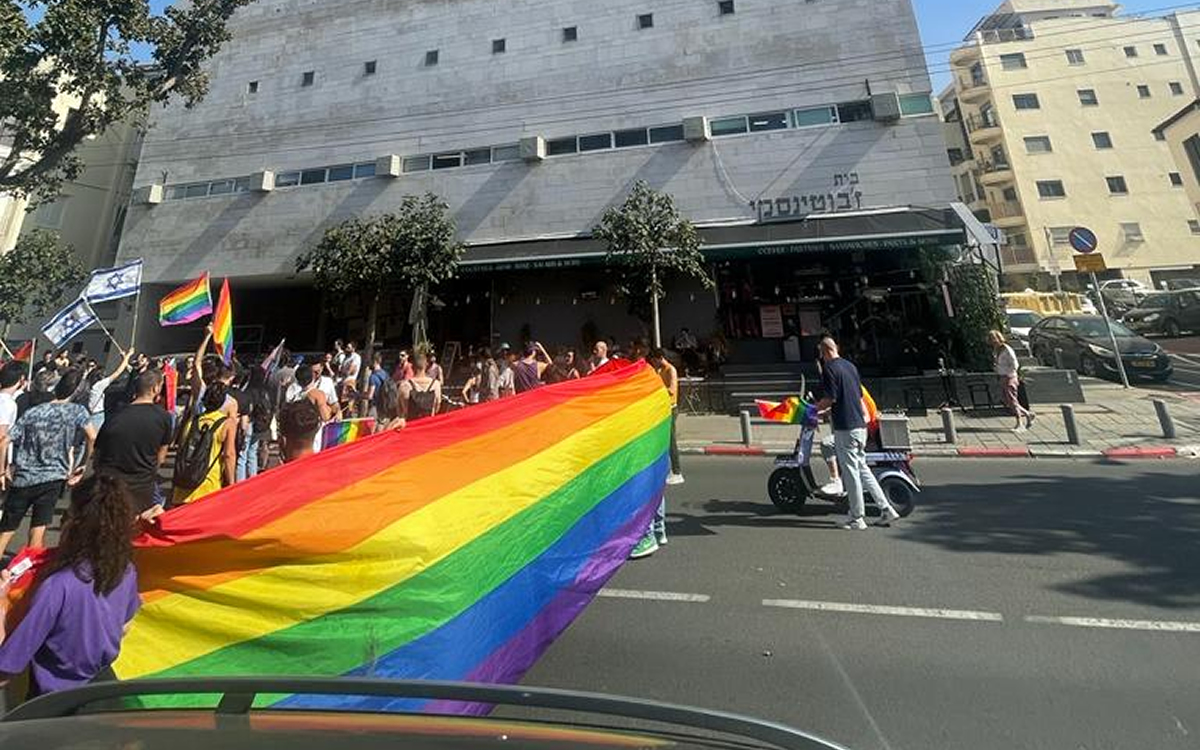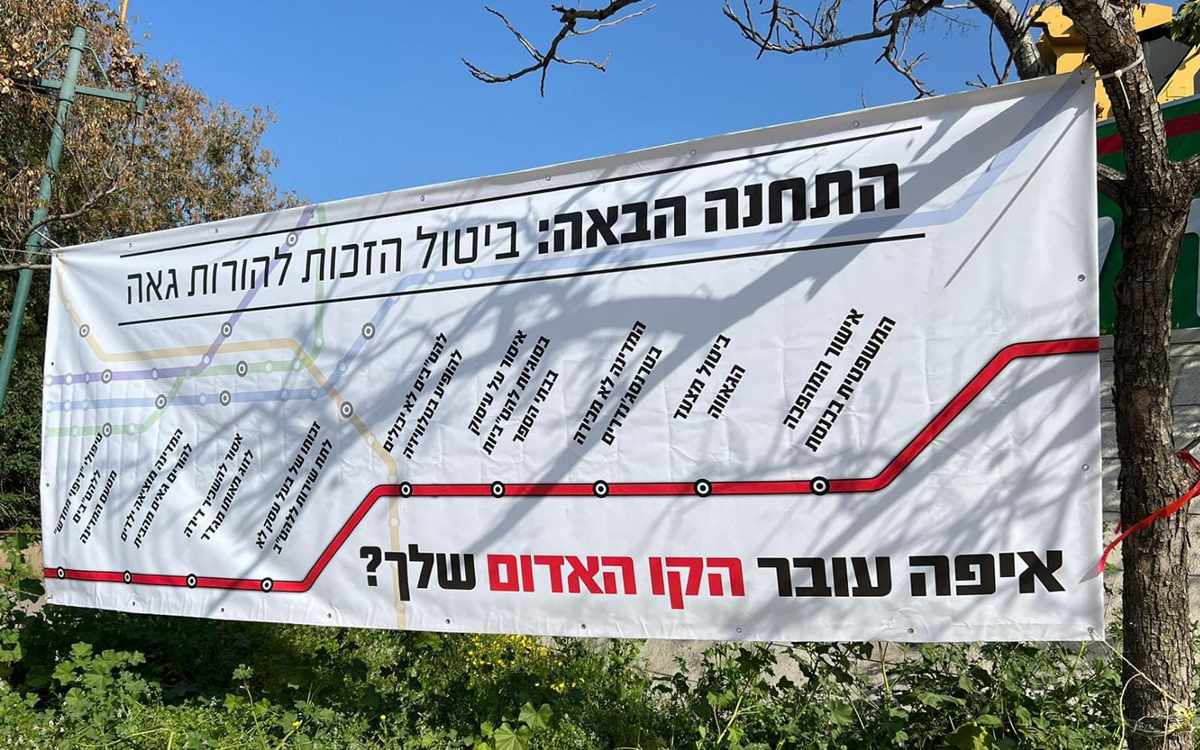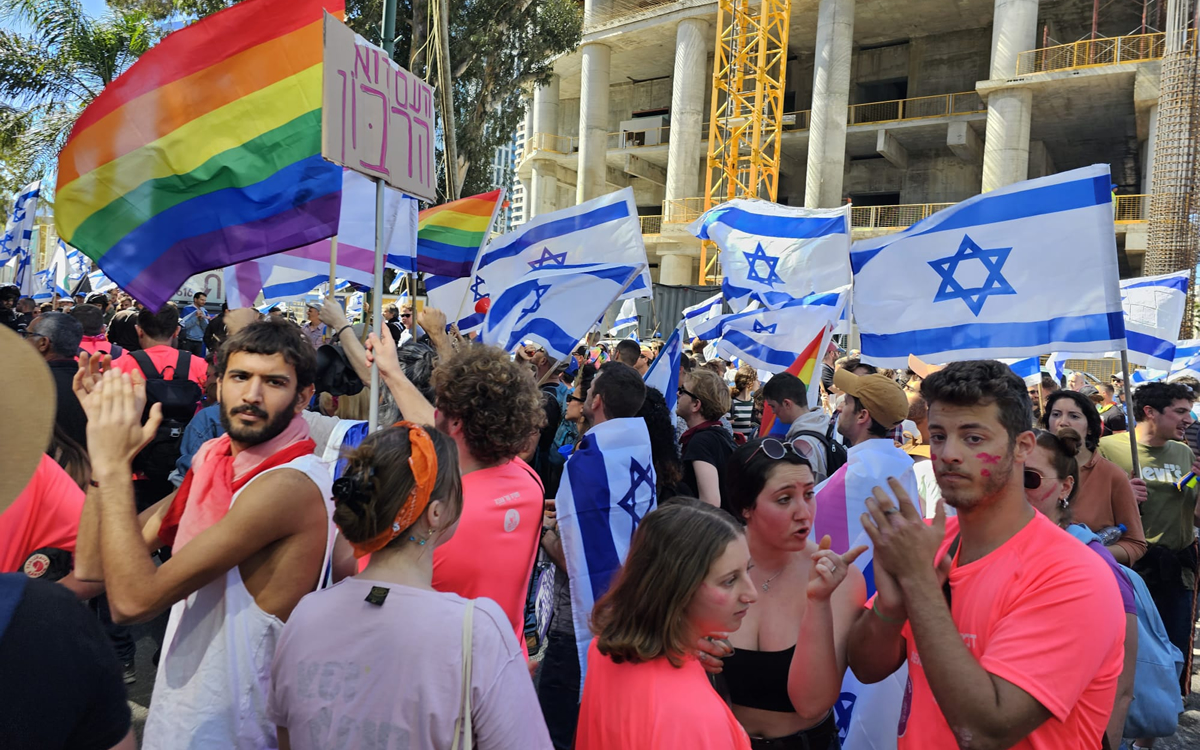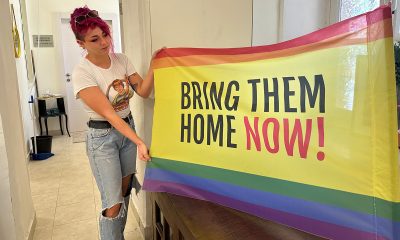Opinions
Silence and complacency are not an option for Israel’s LGBTQ community
Proposed reforms of country’s judiciary have sparked widespread protests

WDG is the Washington Blade’s media partner in Israel.
Thursday was another record day for the protests against the legal revolution that members of Prime Minister Benjamin Netanyahu’s government are trying to carry out. High-tech employees and business owners, doctors and nurses, professors, teachers and students, economists and intellectuals, parents and children, security personnel and activists have united in the protest movement and the number of weekly demonstrations against the coup d’état have increased.
What began as a single demonstration in Tel Aviv 10 weeks ago turned into a huge demonstration of about 300,000 people in front of the Knesset in Jerusalem about a month ago. This movement two weeks ago turned into a Day of Disruption throughout the country and reached its peak on Thursday with the declaration of a National Day of Resistance.
LGBTQ and intersex people and organizations have joined the struggle.
LGBTQ and intersex organizations on Thursday morning held their own protest in Tel Aviv’s Culture Square before they marched with Israeli and Pride flags and joined other protest groups in front of the city’s government building.
These organizations took part in the first demonstrations that took place more than two months ago. They formed a larger LGBTQ group and marched together as one, with gay party promoters joining them later. The Aguda, Hoshan, IGY (Israel Gay Youth), the Gila Project and Maavarim rented buses for LGBTQ and intersex people who wanted to go to Jerusalem and demonstrate in the capital.
Next step: Cancelling the right to LGBTQ parenthood
One of the largest protests to date is the Day of Disruption that took place on March 1.
The day, which began as protests that took place in dozens of cities across Israel as MKs passed bills, for the first time during the protest movement saw violent scenes between protesters and police officers, who used stun grenades to disperse them.
The Aguda and Hoshan before the Day of Disruption hung signs in the train stations that simulated a train route. Bills that would discriminate against the LGBTQ and intersex community and simulating life after the legal revolution’s approval in the Knesset were written in place of station name: The first stop was the cancellation of Pride parades, followed by the cancellation of transgender pregnancies, a ban on discussing LGBTQ and intersex issues in schools and in the media, repealing the discrimination ban removing children from same-sex households and approving so-called conversion therapy.
“The State of Israel is speeding down a path of direct discrimination, and that is our red line. When the first stop is crushing the justice system, the next stops are canceling the right to gay parenthood and allowing discrimination in businesses, just like what happened in Hungary and Poland,” wrote the Aguda and Hoshan in their campaign. “This is exactly the time for everyone to ask themselves where his red line cross — because when the legal revolution leaves the station, it will be very difficult to stop the violation of the rights we fought for years.”

Lesbians on motorcycles at the beginning of the Day of Disruption blocked traffic throughout Ramat Gan and Tel Aviv while on their way to Jerusalem. The Israeli “Pride and Ride” Dykes on Bykes movement led the protest. Dykes on Bykes has existed since 1976, and has emerged as a significant part of the country’s LGBTQ and intersex rights movement and as a symbol of female strength and Pride for every lesbian woman.
At the same time in Jerusalem, writer Ilan Scheinfeld arrived at the Western Wall plaza with his two sons who were born by surrogacy and waved a large pride flag in front of the Western Wall.
Israel’s LGBTQ and intersex families have launched a campaign aimed at Knesset Speaker Amir Ohana, a proud father of twins, in which they tried to appeal to his heart as a gay person who started a family thanks to Supreme Court rulings, and to explain to him what the consequences of a political revolution might be on gay parenting.
Aguda Chair Hila Peer in the evening spoke at the central demonstration in Tel Aviv.
“They think they will push us back into closets. This government has a clear agenda and the LGBTQ community is one of the first in line. This is not legal reform, it is a gun that is being held to the head of the LGBTQ community. They are destroying the only body that protects human rights, so that later they can enact whatever they want against us,” said Peer. “This government has brought up the worst haters of freedom, of equality and of the LGBTQ community, It gave them power over our families, over our rights. We faced crazier, meaner, more violent and broke every closet they ever dared to try build for us.”
“The year is 2023 and we are going nowhere but forward,” added Peer. “Even if you take the court, even if you threaten us in the streets. Even if you deny us right after right, we will not stop. We will not disappear. The LGBTQ community was born out of a revolution, and the LGBTQ community will bring the next revolution.”

Opposition community representatives also tried to disrupt the Constitution Committee’s proceedings, or at least create actions that would cause them to become illegitimate. MK Yorai Lahav Hertzno from Yesh Atid party during one of the debates came up to the table and began chanting “shame” while pointing an accusing finger at MK Simcha Rotman, who chairs the committee The demonstration caused a lot of criticism and the Knesset’s Ethics Committee punished Hertzno.
Why is the LGBTQ and intersex community afraid?
The absolute majority of the rights of the LGBTQ and intersex community in Israel today came from Supreme Court rulings. From treatments for HIV carriers to surrogacy and parentage registration, all achievements were achieved as a result of battles waged in court against the decisions of the government and the Knesset.
The regime change that includes the weakening of the Supreme Court’s power and allows the Knesset to overrule any Supreme Court ruling with a simple majority allows the cancellation of any Supreme Court decision with relative ease. Although laws against the LGBTQ and intersex community are not currently on the agenda, the potential for change is clear such possibility.
If the legal revolution passes, the government will be able to enact laws that directly harm LGBTQ and intersex people — and without an independent court there will be no one to protect them or the rights we have already received.
Already now, under the auspices of the public atmosphere, there is an increase in the number of reports of cases of discrimination and violence against LGBTQ and intersex people in businesses and in the public sphere. This discrimination would be legal if some extreme MKs succeed in their efforts. LGBTQ-phobic members of Knesset are already spreading their dangerous agenda today and promote bills that will harm LGBTQ and intersex youth and the creation of safe spaces in schools.
The LGBTQ and intersex community and its rights are under attack, and LGBTQ and intersex people will be among the first groups to be harmed when the checks and balances are removed from the government. Silence and complacency are not an option for Israel’s LGBTQ and intersex community.
George Avni is the editor of WDG, an LGBTQ and intersex media outlet in Israel.

There can be no other word than “insanity” for how the felon in the White House, along with his Nazi sympathizing co-president, are handling things. They are living in an alternative universe where they think they are a king and an emperor. They are happily screwing the American people, while creating havoc in the world. If the courts don’t stop them, and I am beginning to lose confidence in the Supreme Court, only Congress, if its members grow some cajónes, or the American people with their votes, will be able to eventually do it.
As I have written, Democrats will have to appeal to people at the local level district-by-district, to win. There have been discussions online about who the Democrats will put up in 2028. My view of those discussions are they are a waste of time. Debating whether it will be Booker or Buttigieg, and I am getting fundraising appeals from both, or someone else, is totally useless unless Democrats can win this year in New Jersey and Virginia, and then take back at least the House of Representatives in 2026. If Democrats can’t do that, it may not matter who our candidate is in 2028.
I recently went to a meeting to hear David Hogg, one of the new vice chairs of the DNC. He is a great young speaker. One suggestion I had for the DNC was they call out Sen. Bernie Sanders, an independent, when he suggests people can vote for a third party. There are very few districts in the nation where a third party has a chance in hell of winning. What they do, as we have seen over and over again, is to help Republicans.
Since Trump won, the list of those he is screwing keeps growing. Today it includes veterans, farmers, teachers, and students. He and his Cabinet have ended programs that helped protect African Americans, the LGBTQ community, women, Latinos, and poor people. He has stopped progress on cancer research, HIV/AIDS research, and fired people who help predict our weather. He fired, and then had to rehire, thousands of people fired by accident, and those the courts forced the administration to rehire.
Today in the United States we have a measles outbreak, with the first children in decades, dying from it. This because the man Trump has as his secretary of Health and Human Services speaks against vaccines. Now that a-hole is trying to have fluoride removed from our water, based on one study that says twice the amount we actually use, could cause problems. He recently did admit the MMR vaccine can actually prevent measles, and now suggests potentially using it.
Veterans are being fired from civilian jobs in the Pentagon, Veterans Administration, and other agencies. When asked about the firings, Alina Habba, a counselor to the president, had a dismissive response. “Without providing any evidence, Habba claimed that some who served in the U.S. military and went on to take government service jobs were not doing the work.” She wasn’t contradicted by anyone in the administration, or Congress. So, I would question why any veteran would ever again support Trump, or any of his acolytes.
As Trump moves forward with tariffs, we will see who gets screwed the worst. He paused them for 90 days because business leaders, who supported him, began to question his ideas. “Billionaire investor Bill Ackman, a rare critic among U.S. President Donald Trump’s top supporters, has voiced concerns over the president’s tariff strategy, and voiced, ‘this is not what we voted for.’”
Then came the first, if tepid, sign of some Republican senators taking their lips off Trump’s ass long enough to do their job. It was reported, “signs of GOP wariness emerged Thursday. Republican Sen. Chuck Grassley of Iowa teamed up with Democratic Sen. Maria Cantwell of Washington on a bill that would require the president to give 48 hours’ notice to Congress ahead of his imposition of tariffs, and those tariffs would expire after 60 days unless Congress approves them. The bill, called the Trade Review Act of 2025, was an amendment to a section of the Trade Act of 1974.” Then the bond market began collapsing and even Trump’s Treasury Secretary took notice.
Every day we wake up to another egregious thing the president has done, or wants to do. He sees himself as a dictator and is only interested in what he can do to wreak vengeance on anyone not willing to genuflect before him. My hope is people stop genuflecting, and instead, tell him to go f—k himself.
Peter Rosenstein is a longtime LGBTQ rights and Democratic Party activist.
Opinions
Fired. Depressed. Moved to Canada: Tales from Trump 2.0
We must not normalize what’s happening to our country

It’s been difficult to keep up with the news since Jan. 20, as the attacks on our community keep coming. The same president who nominated the highest-ranking openly gay government official ever (Scott Bessent as Treasury Secretary) is the same president who is killing transgender Americans via his incessantly cruel attacks on their humanity. (When you deny someone access to the bathroom, you deny their humanity.)
I have struggled to organize my thoughts about Trump 2.0. Instead, I am sharing anonymized anecdotes from people I know and love who have been adversely impacted by his cruelty. This is just a sampling of what Trump has wrought in barely three months.
• A close friend with a transgender child abruptly packed up and left the country, driving to Canada. I had no idea until a cryptic social media post prompted me to call. Their trans child no longer felt safe in our country. My friend sold the family home, packed the car, and drove to Canada. My heart breaks for their beautiful family, now geographically separated because of Trump’s attacks.
• Another friend in a high-ranking job was singled out by the MAGA social media mob. She was derided as a “DEI hire” simply because she’s a lesbian. The FBI came to her home and advised building a panic room. She now travels with armed security, something she never had to do before Trump.
• A friend was offered a job by a major news outlet. The offer was rescinded after their boss discovered a nearly 10-year-old blog post they wrote that was critical of Trump. Yes, the mainstream media are caving to Trump’s threats.
• Yet another friend in a senior civilian government post has been forced to fire longtime employees and remove any mention of the LGBTQ community (to which he belongs) from a government website. This includes important studies on LGBTQ health and wellness.
• And another friend who was fired from her federal government job is struggling with depression, unable so far to find a new job after a career in public service that ended with a dismissal for no reason.
Welcome to MAGA’s America, where public servants are ridiculed, threatened, and fired. Where mothers and fathers of transgender children are fleeing the country because their child fears being killed here. Where hard-working business leaders who happen to be LGBTQ or women or Black are targeted and doxed by Trump’s brainwashed, bigoted followers. Where one-time corporate “allies” are running like cowards from their DEI programming and support for the LGBTQ community.
At the Blade, I have fielded multiple requests from sources asking that their names be removed from past news articles because they fear government retaliation merely for being publicly identified as LGBTQ. We’ve never needed a formal policy for such requests until Trump returned to power. After consulting with experts in journalism ethics, we have decided to take such requests on a case-by-case basis. We have a unique contract with our readers, very different from mainstream outlets like the Washington Post, and will find a workable solution as these questions arise.
So now what? Those of us in a position to resist must do so. We must not normalize what’s happening to our country. Firebombing a governor’s residence; storming the U.S. Capitol; plotting to kidnap Democratic governors — none of this is normal or “OK,” as Pennsylvania Gov. Josh Shapiro said in a major understatement last weekend.
Join the growing protest movement around the country. Call and write to your elected representatives urging them to oppose Trump’s agenda, from his stupidly reckless tariff policies to his anti-trans attacks. Attend local town halls with elected officials and denounce the mass firings of federal workers. Read and donate to your local media outlets doing their best to cover all of these attacks on democracy.
And, perhaps most crucially, do what you can to support Democratic candidates running in the 2026 midterms. Our only hope of saving American democracy and the Constitution may be for Democrats to retake one or both houses of Congress next year. The Republicans have a narrow 220-213 majority. Last week, the Democratic Congressional Campaign Committee highlighted 35 GOP-held districts it is targeting in 2026; they only need to flip seven of those. The Senate will be a bigger challenge, though not impossible, as Democrats would need to flip four seats to take control. They have a good shot in Maine and North Carolina. With Trump’s plummeting approval ratings and an economy headed for recession, the Alaska and Ohio Senate races could also be competitive.
Stay engaged and informed. Reach out to friends who’ve lost their jobs to Elon Musk’s craven chainsaw approach to gutting the federal government. Do what you can to support and reassure the trans community that we have their backs. We know better than anyone that silence equals death. So find your voice and speak out.
Kevin Naff is editor of the Washington Blade. Reach him at [email protected].
Opinions
Keir Starmer has blood on his hands
British prime minister’s foreign assistance cuts will kill people with HIV

My name is Mijan. I’m a born and bred East Londoner, a child of immigrants, an ACT UP London/UK activist, and I live with HIV. ACT UP UK and our kin across the pond, ACT UP US, was founded to fight and champion rights of people living with and affected by HIV/AIDS. We are a global coalition that believes in Fund Healthcare Not Warfare, a transatlantic movement that demands global health justice and an end to military prioritisation over the health and wellbeing of human life. The threats we face are the same from funding cuts, state suppression, and queer erasure. U.S. or the U.K. we sing from the same hymn sheet: We will not stand by while our lives are at risk.
On April 8, eight of us ACT UP Activists disrupted Prime Minister Keir Starmer’s Liaison Committee. We were peaceful and determined to execute our die-in. Security was almost as determined to make sure we didn’t. They strong-armed us out of parliament like we were a threat. We tried to begin our die-in, to make a statement for the lives at stake, but instead we were rammed out the revolving doors as we were leaving, which they ended up jamming and dumped on the stairs of Portcullis House. We made the best of a bad situation and laid on the dirty grounds — because this is what democracy looks like in the U.K. when it’s under attack.
Why were we there? Because we are scared and angry. Because we are regressing. Because AIDS cuts means death.
Keir Starmer’s Labour government is enacting the most drastic reduction in U.K. AID cuts we have seen in many years, slashing it from 0.5 percent of gross national income to 0.3 percent by 2027. This is the lowest level of Official Development Assistance spending in years — and it’s being justified to increase defense spending. More missiles, fewer medicines. More tanks, fewer treatments.
Starmer, you justify this under the guise of “security” — but whose security are you protecting? It’s not mine. I live with HIV, and I’m only alive today because of global health funding, funding that made treatment, programs, and vital research possible. Thanks to that support, HIV is no longer a death sentence for many of us. But that’s not the case for everyone.
Not everyone has the privilege of being born in countries like the U.K., where treatment is accessible and free. Many will die because of funding cuts. Many will lose loved ones. We will see HIV contraction rates rise. We will see preventable deaths increase.
Kier, what you are doing is wrong! What you are doing is horrible! What you are doing is deadly!
Don’t take my word for it. Listen to our world health experts. The World Health Organization’s Director-General, Tedros Adhanom Ghebreyesus, has warned that these cuts could cause over 10 million additional HIV infections and three million HIV-related deaths. A new modeling study published in the Lancet HIV by the Burnet Institute backs this up — projecting a 24 percent reduction in international HIV funding by 2026 if current trends continue. Twenty years of progress in HIV treatment and prevention could be wiped out by a single budget.
Deplorable.
Is this what Labour stands for? I thought this party would fight for us.
HIV/AIDS disproportionately affects queer people and people of color — already marginalized communities who are now being discarded. Labour was created by and for people who lived on the fringe of society, the little guy. Labour is meant to empower, support and protect the vulnerable, not sacrifice them. Labour is meant to listen to the people, not silence them and ram them out like cattle to slaughter. Labour should be ashamed. You are not for the people.
We were there for a reason. We were there because lives depend on it. We showed up because diplomacy failed. When we chose peaceful protest, we were met with aggression and suppression. That’s what we need to talk about too. Because this isn’t just about foreign aid anymore — this is also about our right to protest being attacked.
When activists are forced out of parliament for daring to peacefully protest against inhumane policies, it truly puts into perspective a dying democracy.
Democracy is no longer open to the people. Our ability to protest is now treated as a threat to power. Our democracy is under threat. And it’s not just from Tory strongmen. It’s from the very party that’s supposed to be on our side.
This Labour government has abandoned its principles and has abused people’s trust. That it will turn its back on migrants, on the poor, on queer people, on disabled people, and now — on people living with and at risk of HIV/AIDS. It is morally bankrupt.
Bombing your way to justice will not achieve equality. Ignoring a global health crisis and is not progressive. Get your priorities straight: Fund health care, not warfare. Invest in life, not death. Restore the 0.5 percent foreign aid commitment, and stop treating the most vulnerable lives on the planet as expendable.
Keir Starmer, you have blood on your hands.
You may have pushed us out of parliament, but we will not be silenced. We will be louder. We will be bolder. We will not let this die. ACT UP has always believed in one simple truth: SILENCE = DEATH.
Mijan is a pseudonym for an HIV-positive activist who believes that SILENCE = DEATH.
-

 Obituary4 days ago
Obituary4 days agoLocal attorney, LGBTQ rights advocate Dale Sanders dies at 75
-

 U.S. Federal Courts3 days ago
U.S. Federal Courts3 days agoFederal judge blocks Trump passport executive order
-

 Mexico4 days ago
Mexico4 days agoGay couple claims Puerto Vallarta wedding venue discriminated against them
-

 Books3 days ago
Books3 days ago‘Pronoun Trouble’ reminds us that punctuation matters











